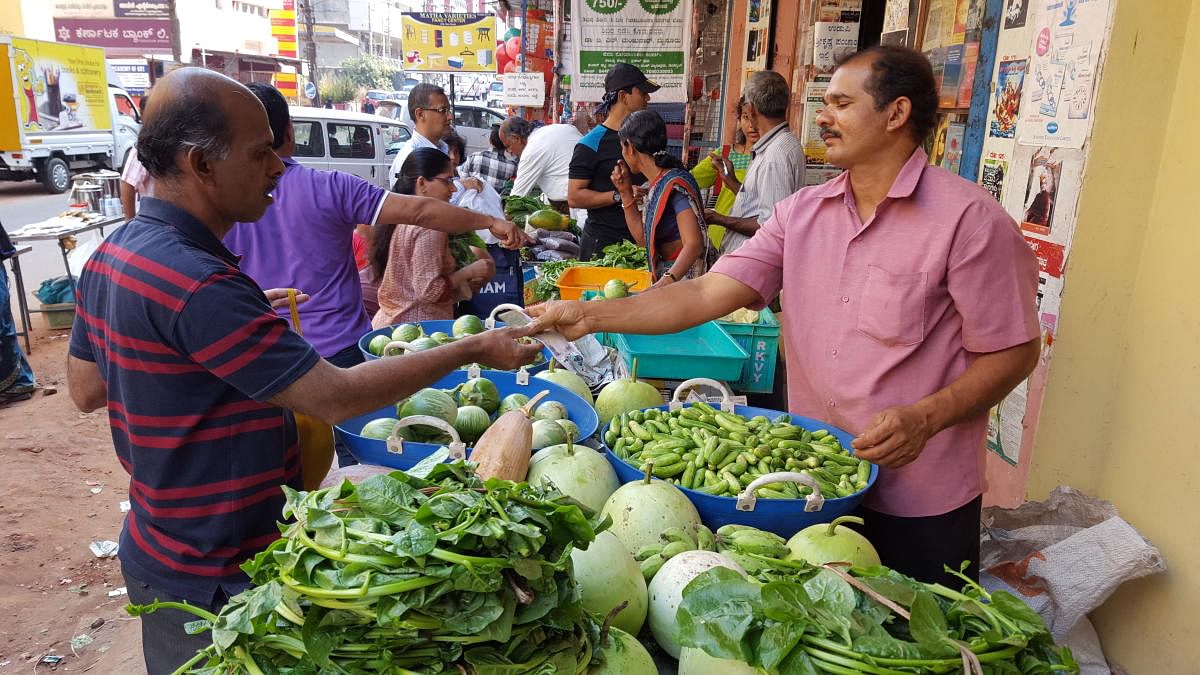
Direct marketing was not the first choice of Shankar Langati, a farmer in Gundenatti village of Khanapura taluk, Belagavi district. He had believed his job was just to produce food in an eco-friendly way.
A decade ago, at a millet fair, he saw some stalls selling his produce at huge profits. “That was not fair to the grower or the consumer,” Langati told DH.
This prompted him to market his produce — grains, pulses, vegetables, fruits —at the Gandhi Shanti Pratishtana premises in Dharwad on Thursdays.
Once he had established his credibility, demand for his products grew. “Now I collect the harvest from about 40 farmers. We have about 200 regular consumers and 75% of our produce gets sold here. The rest is sold to wholesalers and retailers in Mysuru and Bengaluru,” he said. The farmers decide the price on the basis of production and operating costs. “Market exposure helps you improve your post-harvesting and value-addition skills,” he said.
It is this trust that has helped his venture flourish for 11 years. “The consumers discuss crops and food and some even visit our farms. So far, no one has asked us to show our organic certification,” he said.
Yet, he says, certification is essential when it comes to supplying to food processing industries.
Thrives on trust
Savayava Krushika Grahaka Balaga in Mangaluru, which has been organising an organic market every Sunday for seven years, also thrives on trust.
About 40 farmers sell their produce from 6.30 to 10 am. The demand is such that the produce gets sold by 8 am on most days. A group of like-minded organic enthusiasts facilitate the market on a voluntary basis. Consumers and farmers attribute the success of the market to vigilant and committed facilitators.
The facilitators along with consumers visit farmers regularly and sometimes conduct surprise inspections. A core team undertakes a detailed assessment of a farm and its crops before including the farmer to the group.
“We need to ensure quality and genuineness at every step to sustain the movement. A small wrong step can hamper the image and also the word ‘organic’. Over the years, we have removed seven growers when we found they were not committed to the principles of organic farming,” said Addoor Krishna Rao, president of the forum.
Each farmer-member has to share details and quantity of the produce on Saturday and the committee then decides the prices on the basis of the market price and the cost of production.
“The prices are generally 20% more than the market prices. Consumers are okay with them as they get healthy food. It works out well for us after discounting travel and transport expenses. Since I travel 40 km, I collect produce from two or three organic growers in the neighbourhood. Direct marketing provides an opportunity to meet consumers and get their feedback,” said Suhas Marike, who travels from Puttur to Mangaluru to participate in the Sunday market.
Veena Srinivas, a regular at the market since 2017, has visited the farms of all growers who come to the market. She prefers growers’ produce to branded organic products. “While tracing the source is good for consumers, knowing our customers is important to us,” said Mahadevi, an organic farmer.
In Mysuru, such an effort was recently initiated by Dr K Ramakrishnappa, former additional director, Department of Horticulture, and president of Jaivik Krishik Society, a federation of organic farmers.
Even here, the emphasis is on the integrity of the farmer rather than certification. “The system is profitable for both sides, and moreover, customers get fresh produce,” said Ramakrishnappa.
Organic and millet fairs, hosted across the state by the state government and various organisations, provide a platform for growers and consumers to interact.
At a time when big business is taking over the organic market, it is imperative for the organic movement and the government to facilitate decentralised weekly markets across the state. Only such efforts can uphold the spirit of organic farming.